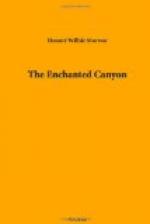BOOK I
BRIGHT ANGEL
CHAPTER I
MINETTA LANE
“A boy at fourteen needs a mother or the memory of a mother as he does at no other period of his life.”—Enoch’s Diary.
Except for its few blocks that border Washington Square, MacDougal Street is about as squalid as any on New York’s west side.
Once it was aristocratic enough for any one, but that was nearly a century ago. Alexander Hamilton’s mansion and Minetta Brook are less than memories now. The blocks of fine brick houses that covered Richmond Hill are given over to Italian tenements. Minetta Brook, if it sings at all, sings among the sewers far below the dirty pavements.
But Minetta Lane still lives, a short alley that debouches on MacDougal Street. Edgar Allan Poe once strolled on summer evenings through Minetta Lane with his beautiful Annabel Lee. But God pity the sweethearts to-day who must have love in its reeking precincts! It is a lane of ugliness, now; a lane of squalor; a lane of poverty and hopelessness spelled in terms of filth and decay.
About midway in the Lane stands a two-story, red-brick house with an exquisite Georgian doorway. The wrought-iron handrail that borders the crumbling stone steps is still intact. The steps usually are crowded with dirty, quarreling children and a sore-eyed cat or two. Nobody knows and nobody cares who built the house. Enough that it is now the home of poverty and of ways that fear the open light of day. Just when the decay of the old dwelling began there is none to say. But New Yorkers of middle age recall that in their childhood the Lane already had been claimed by the slums, with the Italian influx just beginning.
One winter afternoon a number of years ago a boy stood leaning against the iron newel post of the old house, smoking a cigarette. He was perhaps fourteen or fifteen years of age, but he might have been either older or younger. The city gives even to children a sophisticated look that baffles the casual psychologist.
The children playing on the steps behind the boy were stocky, swarthy Italians. But he was tall and loosely built, with dark red hair and hard blue eyes. He was thin and raw boned. Even his smartly cut clothes could not hide his extreme awkwardness of body, his big loose joints, his flat chest and protruding shoulder blades. His face, too, could not have been an Italian product. The cheek bones were high, the cheeks slightly hollowed, the nose and lips were rough hewn. The suave lines of the three little Latins behind him were entirely alien to this boy’s face.
It was warm and thawing so that the dead horse across the street, with the hugely swollen body, threw off an offensive odor.
“Smells like the good ol’ summer time,” said the boy, nodding his head toward the horse and addressing the rag picker who was pulling a burlap sack into the basement.




